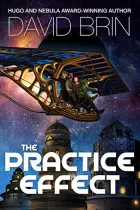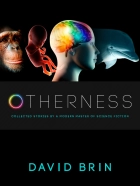The Fermi Paradox is the question of why we seem to be alone in the cosmos. Why don’t we observe any blatant signs of intelligent life in the cosmos, including the great works that our own descendants may begin to build, if we give them a good start in the right direction?
 When I first started writing about this 30 years ago, I called it the Mystery of the Great Silence — a quandary that we’ve covered here and elsewhere, in articles that list over 100 hypotheses for why we appear to be alone. A topic that is also woven into the weft and flow of my new novel, Existence.
When I first started writing about this 30 years ago, I called it the Mystery of the Great Silence — a quandary that we’ve covered here and elsewhere, in articles that list over 100 hypotheses for why we appear to be alone. A topic that is also woven into the weft and flow of my new novel, Existence.
Almost everyone who dives into this subject swiftly chooses a favorite theory. Perhaps life erupts rarely, or intelligence, or most life worlds are more oceanic so that few create hands-and-fire users, or maybe life gets pounded in most places by comets or supernovae. I’ve had the role of cataloguing these theories, refusing to tout just one! But I do have a personal Top Ten list. And two of these most-plausible explanations for the Great Silence are of significance to us today.
That’s because two of them relate to political choices we’ll make next week, in the United States of America. These two scenarios, which may seriously winnow down the number of visible galactic civilizations — and might soon do the same to us — are:
1. Bad governance leads to Big Mistakes (e.g. nuclear war, eco-collapse etc.) that kill off or render impotent many or most technological species. Note that this is a whole class of potential failure modes, a minefield of errors that young, technological races might commit, veering past one doom and escaping the next before tumbling into a third… or fourth… or…
2. Most tech species slump into the same social attractor state that snared 99% of human cultures. That pattern, repeated from Egypt and Meso-America to Babylon, China and Rome — from Tokugawa Japan to Bourbon France to Hanoverian England — was family-based oligarchy. The standard, pyramid-shaped social order wherein conservative elites (king, lords, priests, wizards) squelch rapid scientific advancement and middle class innovation as a threat to their carefully maintained inherited privilege.
This system – (envision all the endless variants on feudalism) – was dominant in nearly all past human societies because, for one thing, it is reproductively self- reinforcing! Indeed, you see the same drive at work in the hierarchy-seeking or harem-keeping behaviors of males in countless other species on Earth. It’s a powerful and deeply natural attractor state and there’s no reason it won’t be likewise compelling in other realms across the cosmos.
At a glance, it is obvious how both #1 and #2 are “Fermi-relevant” failure modes that could stymie many — perhaps most — intelligent-technological species from communicating or spreading among the stars. Other factors may also come into play. But these two are persuasive top candidates.
== Does oligarchy limit the potential for collapse? ==
Contemplating these two potential explanations for the Great Silence raises a question: do these two winnowing factors work together? Or against each other?
 After all, one of the top rationalizations that oligarchies have given, when they suppress science and markets, competitive invention and enterprise, is that the priests and lords are acting for the good of all. Preventing instability and disruption. Indeed, this is a chief point raised by Jared Diamond in his great, highly-recommended, but disturbingly off-target book COLLAPSE.
After all, one of the top rationalizations that oligarchies have given, when they suppress science and markets, competitive invention and enterprise, is that the priests and lords are acting for the good of all. Preventing instability and disruption. Indeed, this is a chief point raised by Jared Diamond in his great, highly-recommended, but disturbingly off-target book COLLAPSE.
In other words, a lot of species might find serenity through #2 — while most of the rest are swept away by #1. Together the pair may help to explain the interstellar quiet. And naturally, the genteel stagnation represented by #2 seems preferable to the effective extinction of #1. Assuming these two choices represent our only alternatives — and some of the characters in my new novel EXISTENCE argue that point — then we have a pretty good idea why the stars appear so lifeless and empty of voices.
But as we’ll see, that may be a false way of looking at things. Rather, I will contend that the oligarchy process guarantees falling into fatal pitfalls, rather than avoiding them.
== The Fermi Paradox and U.S. Politics ==
These two paths and types of failure modes seem especially relevant to the present US elections. COMPETENCE and RENUNCIATION are the distill-words. Even if you favor oligarchic conservatism as a model for our future, over the fevered drive of Periclean-egalitarian positive sum games… you are still behooved to consider the competence issue. But hold that thought. We’ll get back to competence and option #1 in a minute.
First, how does Fermi Choice #2 — oligarchy-pushed renunciation — bear upon the 2012 campaign? It’s relevant!
Consider: in the recent debates one candidate spoke about “science” fourteen times , whereas the other has has barely mentioned it during the campaign trail.
American scientists have voted with their feet, with only 6% now calling themselves Republican. (It used to be about 50%). Indeed, the head of the GOP controlled House of Representatives Science Committee recently and repeatedly declared the Earth to be 9000 years old. Yes, the head of the Science Committee. Of the House of Representatives. Of the United States of America.
 In every conceivable way, from science to education… all the way to the rebuilding of a vastly powerful American Oligarchy, the GOP is your party if you feel that renunciation and a return to traditional patterns of aristocratic rule is preferable to Periclean instability. It is the Olde Way, pushed hardest via a media empire owned by multiple foreign billionaires, including the Saudi Royal Family.
In every conceivable way, from science to education… all the way to the rebuilding of a vastly powerful American Oligarchy, the GOP is your party if you feel that renunciation and a return to traditional patterns of aristocratic rule is preferable to Periclean instability. It is the Olde Way, pushed hardest via a media empire owned by multiple foreign billionaires, including the Saudi Royal Family.
Moreover, it may be that millions of other species faced similar choices and all picked this route! The decision may be inevitable. The star lanes may appear empty because millions of other races made the same, Darwinistically-driven choice — settling into genteel, aristocracy-tended conservatism. Which I’ll admit beats extinction.
 Still, in weighing this choice, I know what decision I will argue for. I vote to keep faith with Pericles and Adam Smith and Washington and Franklin and Lincoln and Jonas Salk and Warren Buffett and the Silicon Valley geeks. Yes, the Periclean Western Enlightenment, with its egalitarianism, transparency, competitive markets, democracy and flat, anti-oligarchic social order does charge ahead into the future. And yes, the faster we charge ahead, the more we’ll need transparency and freedom, to probe ahead of us, finding mine fields, quicksand pools and other pitfall-dangers ahead. And yes, the nostalgia junkies and oligarchy-lovers have a point when they cry out “slow down!”
Still, in weighing this choice, I know what decision I will argue for. I vote to keep faith with Pericles and Adam Smith and Washington and Franklin and Lincoln and Jonas Salk and Warren Buffett and the Silicon Valley geeks. Yes, the Periclean Western Enlightenment, with its egalitarianism, transparency, competitive markets, democracy and flat, anti-oligarchic social order does charge ahead into the future. And yes, the faster we charge ahead, the more we’ll need transparency and freedom, to probe ahead of us, finding mine fields, quicksand pools and other pitfall-dangers ahead. And yes, the nostalgia junkies and oligarchy-lovers have a point when they cry out “slow down!”
But think. The fundamental fact of the Fermi Paradox is that we see no signs of advanced civilization “boldly going” about, out there. So, if oligarchic pyramids are the main attractor state, among the stars, isn’t that an argument that we should try something else? Perhaps something unusual? Something like this enlightenment?
Think about that a while. Chew on it. Put it all together. If 99% of human cultures did the natural thing, and most other sapients do, as well, and we see empty star lanes… then maybe, just maybe, we should do something different. I say we ought to stick with Pericles.
Ah, but that only addresses failure mode #2. Then there is Fermi failure mode #1 and that matter of competence!
== Stand on your record of governance ==
Whether you support the Periclean Experiment (in this election that makes you Blue… or largely a democrat… or maybe libertarian), or else you happen to favor a return to the oligarchic pattern of 6000 years (in other words, a follower of Fox-owners Rupert Murdoch and Prince bin Walied)… there remains the other Fermi Factor listed above.
Factor #1. Is your side any good at governing?
You might yearn for a king, but if the one available is horridly stupid and BAD at statecraft, maybe you should side with the Pericleans for a while and wait for a better king.
 Please. Put aside preconceptions. Use curiosity to overcome the all-too human tendency — to funnel disliked information through the emotional amygdala. If presented with clear and systematic proof that your side is incompetent, will you at least have a look?
Please. Put aside preconceptions. Use curiosity to overcome the all-too human tendency — to funnel disliked information through the emotional amygdala. If presented with clear and systematic proof that your side is incompetent, will you at least have a look?
Cutting through all the polemic, attack ads and sketchy evasiveness, this 2012 U.S. election ought to boil down to which party tends to govern better. On that, the historical record is clear. For those who can still be swayed by factual comparisons – and if you care about the role America might play in taking civilization to the stars – have a look at these stark contrasts and share them with others:
“How Democrats and Republicans differ at defense and waging war,”
This one has gone viral, drawing a lot of hits from regions where soldiers and sailors live. If we must endure dangerous times, shouldn’t we compare who does defense well?
“The Eight Top Causes of the Deficit “Fiscal Cliff,”
 In tallying the reasons for the deficit, we see one party vastly more at fault than the other, and yet that culprit is the noisiest in denouncing the debt it created! Supporting evidence comes from Forbes, the business magazine, which tallied the rate of increase of government spending under the last five presidents, including Reagan. The rate of increase was lowest under Clinton and Obama. Please. Click to scan the Eight Reasons for the Deficit and judge for yourself.
In tallying the reasons for the deficit, we see one party vastly more at fault than the other, and yet that culprit is the noisiest in denouncing the debt it created! Supporting evidence comes from Forbes, the business magazine, which tallied the rate of increase of government spending under the last five presidents, including Reagan. The rate of increase was lowest under Clinton and Obama. Please. Click to scan the Eight Reasons for the Deficit and judge for yourself.
“Which party stands up for science?”
This one is just awful. You cannot name a clade of intellect and knowledge in American life that is not under attack by Fox. But science bears the brunt. That that is an absolute proof which side you must be on, in this trumped up phase of the American Civil War.
These are not convenient, cherry-picked anecdotes or assertions, but complete lists for clear comparison, backed up by economists, generals, admirals and the 95% of U.S. scientists who voted with their feet, abandoning a party that plunged America into anti-science hysteria.
 Finally, do we really want our geopolitics run by someone who thinks that Syria is Iran’s route to the sea?
Finally, do we really want our geopolitics run by someone who thinks that Syria is Iran’s route to the sea?
== Might we be the exceptions? ==
Getting back to Fermi… one question stands foremost: who will govern better? Those who are willing to negotiate openly, fight carefully, manage cautiously and consult science as we charge into an uncertain future? Or dogmatists who erased every scientific panel that used to advise Congress from 1940 till 1996? Because those panels offered inconvenient and impudent things called facts.
The great historian Arnold Toynbee studied every known Earthly civilization and concluded that societies either thrive or fail in direct proportion to how much trust and initiative they willingly invest in their “creative minorities.” The far-lookers and problem solvers.
We are plunging ahead into a mine-field, one that may have killed every other sapient race in our galaxy! Can we be the first to pick a safe path across?
Not if we wallow in nostalgia and tell the smartest people in our society to go to hell.













